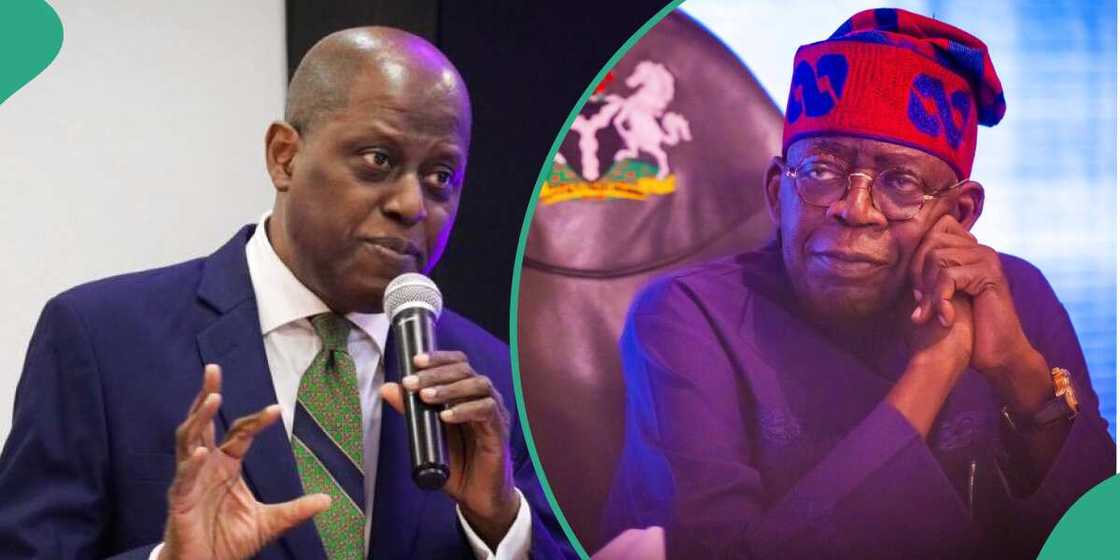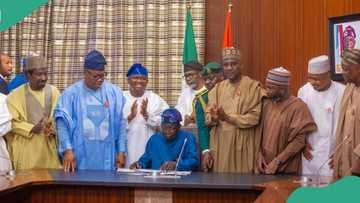Nigeria’s Debt to Hit New Record After Tinubu Makes Big Move on CBN Loan
- Nigeria's total debt is expected to hit N95.2 trillion after the debt management office updates its data
- This is after the lawmakers approved for the president to securitise the outstanding N7.3 trillion Ways and Means
- Analysts are concerned about the increasing public debt and its already manifesting implications for the country
Legit.ng journalist Zainab Iwayemi has over three years of experience covering the Economy, Technology, and Capital Market.
The official data on Nigeria's public debt profile reveals a notable surge, surpassing an eightfold increase in the last ten years.
This substantial growth becomes even more evident when considering the inclusion of the central bank loan recently authorised for securitisation by President Bola Tinubu.

Source: UGC
Legit.ng recently reported that the Senate approved President Bola Tinubu's proposal to securitise the outstanding N7.3 trillion Ways and Means.
PAY ATTENTION: Share your outstanding story with our editors! Please reach us through info@corp.legit.ng!
According to BusinessDay report, the inclusion of N7.3 trillion owed by the federal government to the CBN in the debt office's data will push the country's public debt stock to at least N95.2 trillion.
Total public debt is now N87.9 trillion
Before the securitisation in May 2023, the debt owed to the CBN had surged to N26.95 trillion. The additional N22.7 trillion added to the country's public debt stock drove the debt higher.
From N49.85 trillion in the first quarter of last year, the overall public debt increased to N87.38 trillion in the second quarter of last year, according to data released by the Debt Management Office in September. By the end of the third quarter, it had risen to N87.91 trillion.
Adeola Adenikinju, president of the Nigerian Economic Society, said:

Read also
2024 Appropriation Bill: Lawmakers budget additional N30bn for national assembly renovation
“I think we are getting to a very concerning stage – a stage where all of us need to be a little bit worried about the rising public debt because there are at least two implications.”
He added that there is some crowding out effect that is taking place. He said the development will make it difficult for private sector investment to thrive. He also stated that the development would also increase borrowing costs for businesses.
Adenikinju proposed that the country must find a way to grow government revenues and pursue alternative financing and capital spending sources, given that government revenue to GDP is very low.
Legit.ng earlier reported that former president Olusegun Obasanjo has stated that given Nigeria's extensive debt portfolio, the country may find it difficult to secure debt relief.
Obasanjo also said that successive administrations' alleged mismanagement of the debt relief from the Paris Club has caused the country to plunge into a vast and undeserved debt.

Read also
Student loan vs School feeding: Why Tinubu's N150bn scheme can't work in Nigeria, experts reveal
Charles Abuede, a financial analyst, said the approval to extend the outstanding N7.3 trillion Ways and Means for Nigeria indicates a measure to manage short-term fiscal needs.
He added, "The clarification that it's not about borrowing more money but adjusting payback terms suggests an effort to navigate existing financial obligations rather than seeking additional debt.
"This approach aims to maintain fiscal flexibility while addressing immediate financial requirements. The overall impact on Nigeria's economic stability will depend on effective fiscal management and the ability to meet repayment obligations."
Nigeria successfully repays Chinese World Bank loans as debt servicing jumps by 277.64 per cent
Legit.ng reported Nigeria spent about 277.64% on external debt servicing in Q3 of 2023, data from the Debt Management Office (DMO) shows.
An analysis of the data indicates that external debt servicing stood at $368.26 million in the second quarter of 2023.
The figure increased to $1.39 billion, showing a 277.64% rise in the three months under review.
PAY ATTENTION: Unlock the best of Legit.ng on Pinterest! Subscribe now and get your daily inspiration!
Source: Legit.ng



